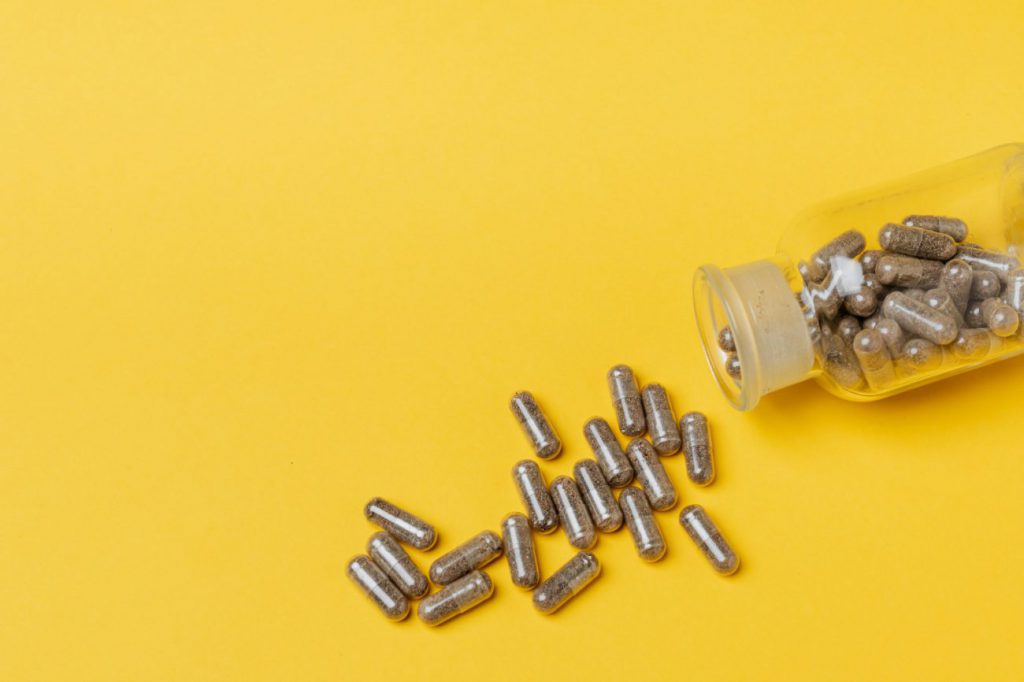
Recommended Vitamins and Supplements for Seniors
LAST UPDATED: September 8, 2021
Obtaining the right vitamins and minerals is a crucial part of our lives, and as we age, the lack of them can bring a number of challenges to our health. Changes in our habits and dietary needs as we age are things that can affect how well we feel. For this reason, it is important to take care of yourself and your nutritional intake— from foods to supplements. Some people may find they need more vitamins than others, due to their diet or lifestyle. This blog post will discuss what vitamins many seniors should be taking on a daily basis for optimal health and wellness.

Crucial Vitamins and What they Do
Let’s break it down, shall we? There are 13 essential vitamins and they each meet a function that benefits your body in a specific way. You can use this short guide to learn what each of them does and get a better idea of what you may be lacking.
Vitamin A is essential to keep up with the health of one’s eyesight, yet this supplement additionally fortifies our immunity framework so we can battle sicknesses better and age more gradually by keeping skin fresh-looking.
Vitamin C is one of the most important vitamins that you can consume. It does everything from preventing disease to giving your immune system a boost, which protects your body against infections and illnesses. Vitamin C also helps with wound healing by speeding up the production of collagen – an essential part for healthy tissue growth during mending-time!
Vitamin D plays many different roles in our body. It strengthens our bone structure while also increasing the absorption of minerals such as magnesium or selenium, which can be found in dark leafy greens. It also helps you absorb calcium for stronger teeth (and better sleep!).
Vitamin E is a fat-soluble vitamin that fights free radical damage. It is an antioxidant and has been shown to help stop the progression of atherosclerosis. It protects your cells from oxidative stress by being an antioxidant (like Vitamin C), and by slowing down cholesterol production which reduces plaque on artery walls.
Vitamin K is a vitamin that has many benefits. It can help build strong bones, prevent hemorrhages and reduce the risk of stroke by preventing blood clots from forming in your brain or lungs.
B Vitamins
B1 or Thiamine helps prevent complications in many different parts of your body, such as the nervous system, brain and stomach among others.
B2 or Riboflavin helps the body metabolize fats and proteins. It helps produce energy and strengthens the body’s ability to grow hair. It also provides antibacterial properties, boosts metabolism, and enhances iron absorption in our bodies.
B3 or Niacin is used for lowering high cholesterol levels and reducing the risk of heart disease. But Niacin has a lot more than just that to offer as well! It helps maintain healthy skin by boosting collagen production in your cells from all those antioxidants they’re getting.
Pantothenic acid or Vitamin B5 for short is an essential water-soluble nutrient that converts fats and carbohydrates into usable energy. It has lots of uses in our diet including aiding digestion and boosting immune system functionality, but its most important role is to help us maintain healthy skin by keeping it plump, elastic, and moist with an even tone.
B6 helps with the production of serotonin and dopamine which have many roles in our bodies including improving moods, sleep cycles, hormone balance and reducing food cravings. Vitamin B6 is one out of eight essential vitamins for maintaining a healthy body.
Biotin or Vitamin B7 helps process the food we eat which converts what you put into your mouth from energy-giving nutrients like glucose or glycogen back into stored fuel for later use. It also plays an important role in helping to maintain healthy hair, skin, nails and nerves.
B12 is essential for many functions throughout our body including keeping nerves working properly (by producing myelination) and helping the breakdown of dietary fatty acids from sources such as milk or meat.
Folate plays an important role as it helps with DNA synthesis and repair because not having enough leads to gastrointestinal issues such as inflammation, ulcers etc., but also heart disease since most people are deficient without realizing it!

Vitamins Seniors May Need Most
Seniors need vitamins and minerals that may not be the same as their younger selves. As we mentioned, when the body changes with age, it is important to cater to its particular new needs and pay attention to the multivitamin and diet intake for optimal wellbeing. We’ve compiled a list of nutrition tips for seniors that come in handy to help understand their supplementation needs.
For high blood pressure, high blood sugar and high cholesterol
Omega 3 is important for your heart health and brain development, as well as other areas of the body. Omega 3 can increase good cholesterol while decreasing bad cholesterol in our bodies, promote healthy blood clotting by strengthening weak vessels walls or ruptured artery sites, and reduce inflammation that may be a factor in arthritis, asthma and autoimmune diseases like lupus erythematosus (LE).
Osteoporosis, balance issues and vision loss
Vitamin A and D: Vitamin D regulates our body’s calcium levels and helps control phosphorus, magnesium, and potassium use. Vitamin A has many different functions in the eye including night vision as well as stimulating immune cells to fight off infection. Vitamin D helps maintain healthy bones while boosting your immune system and reducing inflammation throughout the human body; meanwhile, Vitamin A similarly boosts immunity while improving eyesight and preventing age spots.
Weight gain and mood
Probiotics are great for improving gut health. Probiotics help colonize the intestines with healthy bacteria, and potentially reduce or eliminate harmful ones that can cause symptoms such as chronic fatigue, weight gain, depression. They help your body make its own vitamins by producing B-complexes of nutrients in conjunction with food sources, including carbohydrates from whole grains. B12 works to improve mood and help with sleep cycles, as this powerful vitamin balances out your system.

What Supplements Should Not Mix
As important as it is to know what supplements work, it’s also important to know which ones may not. Seniors don’t need to be inconvenienced with deciding which supplements to purchase, then going to the store to actually get them. So here are a few common combinations that should not be mixed together.
Magnesium and Calcium
If you are low in both calcium and magnesium, then taking a supplement of each mineral can help maintain strong bones. But if your diet is already high in these nutrients or if there’s an imbalance between the two minerals internally, it may cause side effects such as stomach pain or diarrhea.
Vitamins A, D, E and K
Taking Megadoses of Vitamins A, D, E and K can lead to toxicity. Taking high volumes of these may be harmful to the digestive tract, cause inflammatory bowel disease (IBD), chronic pancreatitis, and cystic fibrosis, and may decrease the absorption of fat as well as the immune system since in turn, it decreases the absorption of fat which is needed in order to absorb vitamins that are crucial for a healthy body.
Zinc and Copper
When taking your dietary supplements, make sure to space them out. Taking a zinc and copper supplement at the same time may cause you some stomach problems. It is best to wait 2 hours before consuming another mineral or vitamin-based product than risk any adverse reactions that could occur as a result of being overdosed on these nutrients!
Vitamin K and Blood Thinners
Warfarin works against Vitamin K, which helps your blood clot. To make sure that Warfarin is effectively thinning the blood, it’s important to eat about the same amount of Vitamin K every day. This means eating an equal number or more than one type of food each day with a lot of Vitamin K in them such as leafy green vegetables and broccoli.
This is where personalized supplement subscription boxes come in handy, as they allow for a safe experience that caters to the specific needs of the individual, and works with their deficiencies to improve them accordingly.

Why Personalized Vitamins Based on DNA?
Personal nutrition data enables us to see what vitamins and minerals are lacking in the body and which ones are doing well. Autumn uses DNA testing to accurately represent which nutrients you need by creating a thorough report that is analyzed to create a personalized A.M. and P.M. supplement packs.
The amazing news is, even seniors can use Autumn to get the most accurate picture of their health, and avoid using over-the-counter vitamins that often contain other additives that may not settle well with their pills, diet, and health conditions. We work to meticulously create supplements that work with their deficiencies so they can rest assured that their system is getting what they need to function properly and complement their diet, in order to live their best lives. In other words, we curate the ideal combination of vitamins and minerals that will remove the guesswork from choosing the proper supplements, and create an easy path to wellness while also enhancing health. All delivered right to their doorstep. Get started on your customized vitamin plan.
